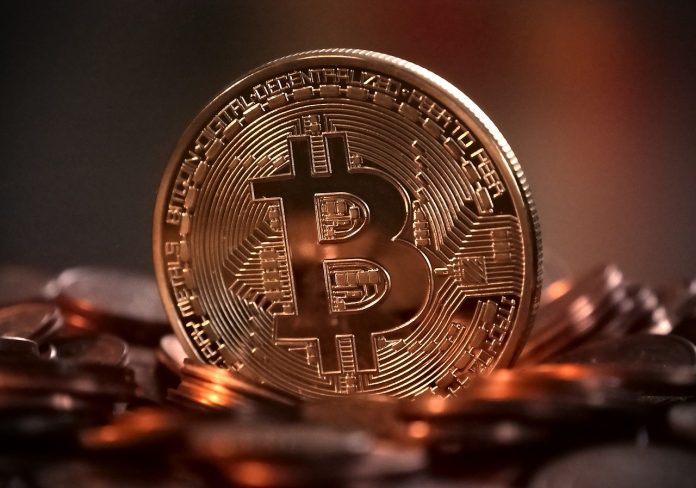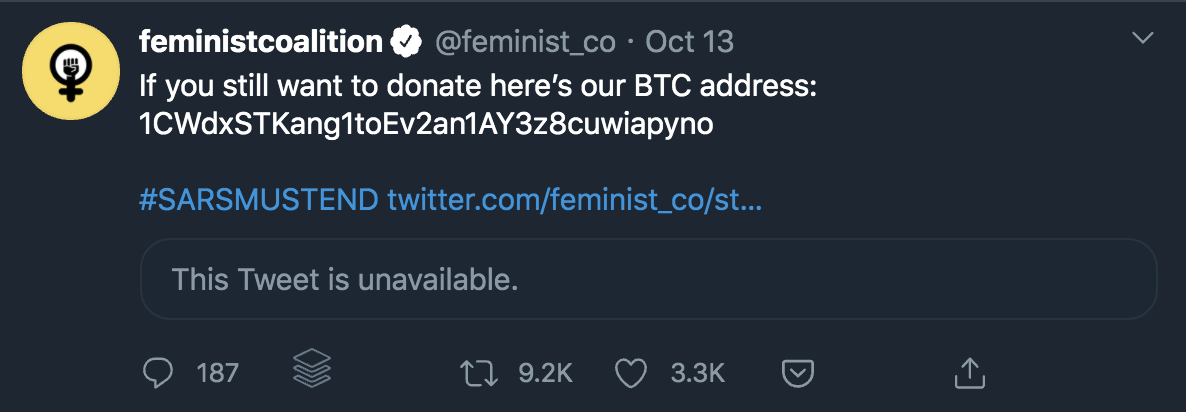
Over ten days now, protesters have taken to the streets of major cities in Nigeria to protest against the brutality of the Special Anti-Robbery Squad (SARS) and extra-judicial killings by police officers. A major part of these protests has been fundraising campaigns by organizations to support activities around the protest. Fundraisers and donors hit a roadblock a few days into the ongoing protests as bank accounts got suspended, and donation links were deactivated.
Protesters quickly moved to receive donations in bitcoin to prevent potential censorship. In this article, we look at why protesters are opting for bitcoin donations.
The root cause of the protest
The low exposure of law enforcers to cryptocurrencies and their ignorance about digital currencies has led to police brutality on crypto proponents and other tech-inclined individuals who are constantly harassed in Nigeria by the Special Anti-Robbery Squad (SARS). This is all the more preposterous because this unit has been acting out of their jurisdiction as it was not created to tackle cyber-related issues. Reports from social media also have it that their activities include unwarranted invasion of privacy, as seen in a tweet from a Nigerian.
“This is much different. Nigerian youths are getting harassed and murdered for having crypto apps on their phone by sars (special anti-robbery squad). They now go out with BTC wallets to force their victims to send them BTC. They shoot if you resist them from going through phone & laptop.”
Several groups opened up donation accounts, asking people to send funds to support activities during the protest. The Feminist Coalition, an independent organization, set up to advance equality for women in Nigeria, has taken the front row in supporting the peaceful protesters with donated funds. So far, the organization has been able to raise millions of naira to support the movement.

The money raised by the group is fostered towards funding medical care, legal actions, and refreshment for protesters across the country. All donations for the protest were initially made through bank accounts and Flutterwave (a form of a virtual bank account). The millions of naira raised were felt during the protests as medical and legal bills were taken care of, and protesters were fed throughout.
All of this came to a standstill as The Feminist Coalition reported that their bank accounts were shut down, and the Flutterwave donation link was deactivated.
To fight back at the attempted censorship and continue with the essential activities needed to support the protests, The Feminist Coalition quickly set up a bitcoin address to receive funds.
In a matter of a few hours, over 4,000 USD was donated. At the time of writing, almost 5 million Naira has been donated via the bitcoin address to support the protest.
Why use Bitcoin during a protest?
Beyond the obvious facts that bitcoin is very popular in Nigeria, and there was a need for an alternative, there are intrinsic features of bitcoin that makes it a perfect fit for times like this.
Bitcoin is decentralized and cannot be censored. Unlike traditional currencies issued by central governments and banks, bitcoin is not managed by an individual or single group. This makes it impossible to stop people from transacting and using the digital currency.
Since a single individual does not control bitcoin, people can receive payments all over the world without the need for permission. In situations where companies operating cryptocurrency exchanges are asked to shut down, people can still exchange their bitcoin for local currencies in a peer-to-peer (P2P) way. P2P transactions only require two people with no middle man to agree on the terms of the exchange and complete the transaction.
What’s more, bitcoin allows users to send and receive money anonymously. Unlike banks and fintech apps that require users to submit details about their identity, bitcoin can be used without tying your identity to your accounts.
Even though some bitcoin apps require verification due to regulation, bitcoin can be used in a peer-to-peer (P2P) manner where transactions are only between two individuals. There are several P2P platforms in Africa that make this possible.
During protests like these, some donors may not want to be identified and will prefer to donate anonymously to avoid political backlash or consequences that may come by associating oneself to movements like these. Bitcoin makes it easier for people to donate without a trace to their identity or organizations.
Beyond social justice movements, cryptocurrency platforms are also contributing to the protest. African crypto startups have taken the protest a step further by providing financial aid to support protesters by giving them water, snacks, and other tools to aid them. The companies that have participated so far include Bundle Africa, Bitsika Africa, CoinsApp Global, and Quidax Africa.
Nigeria continues to be the hottest cryptocurrency market with several companies and lots of adoption. The use of bitcoin during these protests shows the evolution of bitcoin and other cryptocurrencies from just assets for speculation to currencies with real-world use cases.
Guest post submitted by BlockNewsAfrica.com.




